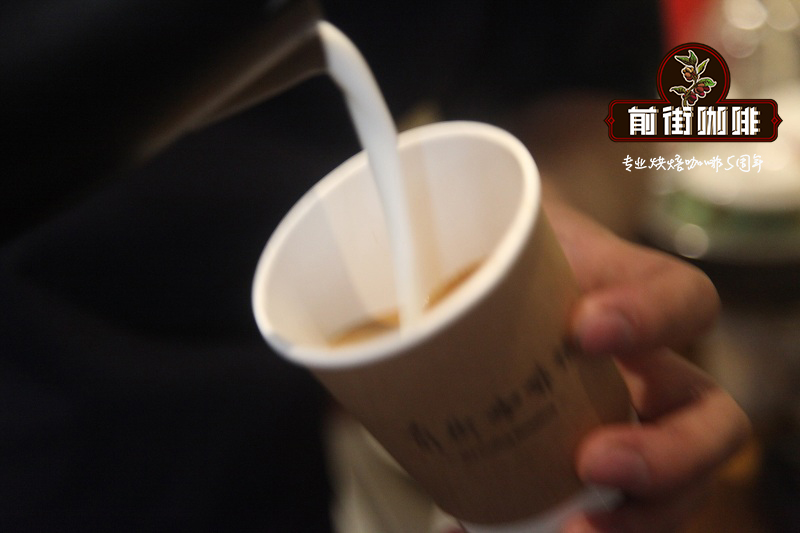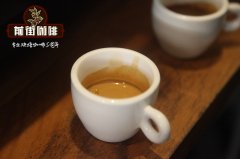Papua New Guinea Coffee _ Paradise Bird Coffee Bean flavor description _ how much is a cup of Paradise Bird Coffee

Professional coffee knowledge exchange more coffee bean information please follow the coffee workshop (Wechat official account cafe_style)
What is the special flavor of Paradise Bird Coffee beans, the most famous coffee beans in Papua New Guinea? How much is a cup of bird of paradise coffee in a cafe? If you rush at home, will it be more affordable?
| 01 | production area profile |
The people of Papua New Guinea regard the beautiful bird of paradise as a bird of freedom and joy, a "gift of the gods". PNG AA Sigri Manor Arabica Coffee, like the migration of birds, was bred from the Jamaican Blue Mountain Ironka to Papua New Guinea, with the same ancestry of the Jamaican Blue Mountains.
In Papua New Guinea, coffee is a national crop and the only crop consumed in the country both domestically and abroad. 90% of it is grown by small farmers, supporting the income of three citizens (nearly 400000 households). Here, farmers have been passionate about growing Arabica for decades.
Sigri Siguri Manor Paradise Bird Coffee beans
The Higrid / Bird of Paradise Manor is located in the Waghi Valley in the Western Highlands Province (Western Highlands), about 1500 meters above sea level, with well-drained volcanic soil. The manor was founded in 1950 and has been a pioneer in the local coffee industry for more than 60 years.
In Papua New Guinea, 95% of the coffee comes from the highlands. Sigri Plantation, located in the Wahgi Valley of the western plateau of Papua New Guinea, is about 1600-1800 m above sea level. Here, the climate is cool, the soil is fertile and the rainfall is abundant. Sigri has a wealth of experience in coffee cultivation and processing. In the 1950s, coffee beans were widely grown in Papua New Guinea, and Sigri was one of the earliest plantations. And because of its unique high-quality coffee, it is famous in the world.
The Sigri plantation has adhered to a high standard of planting and treatment system for many years. During the harvest season from April to September each year, only fully ripe red fruits of coffee can be picked by hand, making the coffee cherries sour and sweet. At Sigri, cup tests are conducted every day to ensure that the plantation provides customers with gourmet coffee of the same quality. As a result, Sigri has become a classic of boutique coffee in the world.
At the peak of the harvest, Sigri employs about 6000 people, half of whom eat and live in the plantation's own staff house, which has free clinics and primary schools for employees' children.
The Sigri plantation also protects soil and water, rejects the use of pesticides and pesticides, and takes care of the ecology and nearby birds. According to current records, there are more than 160 different species of birds in the Wahgi Valley, including 90 species on the Sigri plantation, including the bird of paradise, the national symbol of Papua New Guinea, a veritable bird paradise.
02 | processing method
Due to its geographical location in the southern hemisphere, the local coffee harvest season is from May to August (most of Central and South America is harvested from October to February of the following year). After harvesting ripe red coffee cherries on a vast area of nearly 413 hectares of land, farmers send them to the manor's own treatment plant for post-processing, but the local washing treatment in New Guinea is different from that in Central and South America.
Use three times of water washing and fermentation, each time soak for about 24 hours, and change clean water to control the coffee flavor; after cleaning, remove the shell of raw beans and then carry out various grades, such as AA, AB, PB beans, etc., this fine post-processing method brings bright and delicate fruity flavor to the coffee itself, clean and long sweet taste.
Higrid / Paradise Bird Manor also attaches great importance to ecological issues in the park, planting two different shade trees to provide a good growing environment for coffee and a good habitat for birds. At present, there are 90 different species of birds and wild animals in the park, which is an excellent model for the sustainable management of coffee farms. In particular, it is worth mentioning that coffee cultivation in Papua New Guinea basically uses no artificial fertilizers, no chemicals, and all pest control is carried out in a natural and non-toxic manner.
Papua New Guinea is located on the island of Guinea, with Indonesia but coffee taste with Mantenin's round and full Papua New Guinea beans, taste clean, full of flowers and sweet.
The vast majority of PNG coffee is made up of small farmers, rather than large organized companies, and more farmers grow coffee trees from 20 to 500 or 600. PNG basically uses no artificial fertilizers, no chemical sprays, and all farm diseases and insect pests are controlled by hand.
The original three-stage washing method, 3 times 24-hour washing process, can achieve the complete removal of the pulp, and then dry in the natural sun.
03 | Analysis of raw beans
Coffee grades in Papua New Guinea: a total of 12 grades, classified by defects
Grade Grade
Legume size Screen Size
AA
> 18
A
seventeen
AB
> 16 (50%)
> 17 (50%)
B
> 16
C
> 15
PB
11-14s
X
Mixed
E
> 19
PSC
> 15mm
Y1
Mixed
Y2
Mixed
T
Mixed
(for Arabica only)
The meaning and rules of the name of raw coffee beans in Papua New Guinea:
PNG Plantation Y
Country + planting type + grading name
In Papua New Guinea
Plantation (plantation) and Large Estates (large manor) account for 25% of the national output.
Small and medium-sized farms (Holdings or Blocks) with a size of 10-20 hectares account for 10% of the output.
In PNG, there are 76 registered plantations and estates.
Take the most eye-catching boutique AA and An as an example:
The main results are as follows: (1) AA and Grade A coffee belong to the grade of boutique coffee, mainly from larger estates.
In the case of AA, the size of the bean is larger than 18 mesh, and the shape of the bean is oval. Number of shortcomings: a maximum of 10 defects per kilogram. The appearance of raw beans is green and slightly blue. The taste of raw beans should be clean and the taste of baking should be clean and smooth. The taste of the cup should be excellent (Fine Cup).
(2) the size of Class An is larger than that of 17 mesh, and the cup test must be at least GTF (Good to Fine), that is, good to excellent taste-the number of other defects and the condition of raw beans are the same as AA.
Raw bean information
Producing area: Sigri Manor, Papua New Guinea
Harvest time: April to September
Grading: AA
Variety: Typica
Planting height: 1600-1800 m
Processing method: washing
Flavor characteristics: peach Peach, nut, longan Dried Longan, juice Juicy, white tea White Tea, transparent Transparent, excellent sense of balance Well Balanced
This batch of PNG AA Sigri Manor is packed in 30KG inner bag. Because of its Jamaican Blue Mountain Ironhide pedigree, it has a taste similar to Blue Mountain Coffee, with excellent balance, elegant and comfortable acidity and a long and pleasant return. It is a boutique coffee with the characteristics of the producing area.
04 | Baking analysis
Iron card is a low-density raw bean, so it is not suitable for deep baking, with refreshing sour taste and fruit aroma, we will choose moderate baking, will focus on the firepower adjustment after the first burst, first determine the condition basis of raw beans, and then determine the baking method, first of all, it is a washing processing method, low density, water content of 10% of the 17-year-old beans, according to the existing status of raw beans to set the input temperature.
Yangjia 800N, raw bean 550g, specific operation:
Put the furnace temperature to 200 degrees Celsius, set the throttle to stew for 1 minute, adjust the firepower to 160 degrees, keep the throttle unchanged, adjust the firepower to 160 degrees, drop to 115 degrees, bake to 5: 35 ", the temperature is 152 degrees, the bean table turns yellow, the smell of grass disappears completely, dehydration is completed, throttle tune 4.
In the 9th minute, ugly Hu wrinkles and black markings appear on the bean table, and the smell of toast obviously changes to the smell of coffee, which can be defined as a prelude to an explosion. at this time, listen clearly to the sound of an explosion point, to 8: 40 "start an explosion, small firepower remains the same, the throttle is fully open 5 (the firepower should be very careful, not so small as to be free of cracking sound) 40 degrees, 191.3 degrees when the pot.
The taste of cup test
Baking degree: medium baking
Dry aroma: nutty, woody, spicy
Wet incense: sugarcane sweet (cane), hazelnut (hazelnut), toast-like
Palate: the sweetness of toast, the sweetness of nuts, the acidity and sweetness of some micro-fruit acids form a good layer, the finish of the spices is very sweet and special, the taste is rich and balanced, with sweet taste and bright acidity, with fruit-like aromas.
04 | Analysis of brewing of Paradise Bird Coffee beans
Recommended cooking method: hand flushing
Degree of grinding: 4 (Fuji R440)
Water temperature: 89 °C
Other suggestions for trickling extraction:
Normal pressure, recommended grinding degree of 3.5-4 / water temperature 90 °C
Philharmonic pressure, recommended 3 degree of grinding, water temperature 85 °C
Siphon: 4.5 degree of grinding, water temperature 91 °C
Paradise Bird Coffee Bean Brand recommendation
Papua New Guinea Paradise Bird Coffee beans baked on Qianjie Coffee are fully guaranteed in terms of brand and quality. And more importantly, the performance-to-price ratio is extremely high, a pack of half a pound 100 grams, the price is only about 85 yuan. According to the calculation of 15 grams of powder per cup of coffee, 15 cups of coffee can be made in a bag, which costs less than 6 yuan per cup, which is recommended by conscience compared to the price sold in cafes for dozens of yuan a cup.
More promotional activities
Please keep an eye on us.
Our Taobao shop: coffee shop in front of the street cafe
Important Notice :
前街咖啡 FrontStreet Coffee has moved to new addredd:
FrontStreet Coffee Address: 315,Donghua East Road,GuangZhou
Tel:020 38364473
- Prev

Who tastes better, the world's most expensive coffee beans, Rose Summer or Blue Mountain? how to drink authentic Blue Mountain coffee beans?
Professional coffee knowledge exchange more coffee bean information Please follow the coffee workshop (Wechat official account cafe_style) people are always looking for the best things, looking for the most mellow wine, the most charming cigars or the noblest champagne, etc., and coffee is the same, it is happy to drink good coffee, so people begin to pursue better coffee, from
- Next

Introduction of Papuan Paradise Bird Coffee Bean Variety _ relationship between Paradise Bird and Blue Mountain _ Paradise Bird Coffee Price
Professional coffee knowledge exchange more coffee bean information please follow the coffee workshop (Wechat official account cafe_style) Papua Paradise Bird coffee bean variety turned out to be the oldest and most classic tin card species, and Jamaica Blue Mountain Coffee and Hawaiian kona Coffee is actually the same variety! No wonder Bird of Paradise coffee is expensive, but except for a chain coffee shop, you can drink something new in Papua.
Related
- Does Rose Summer choose Blue, Green or Red? Detailed explanation of Rose Summer Coffee plots and Classification in Panamanian Jade Manor
- What is the difference between the origin, producing area, processing plant, cooperative and manor of coffee beans?
- How fine does the espresso powder fit? how to grind the espresso?
- Sca coffee roasting degree color card coffee roasting degree 8 roasting color values what do you mean?
- The practice of lattes: how to make lattes at home
- Introduction to Indonesian Fine Coffee beans-- Java Coffee producing area of Indonesian Arabica Coffee
- How much will the flavor of light and medium roasted rose summer be expressed? What baking level is rose summer suitable for?
- Introduction to the characteristics of washing, sun-drying or wet-planing coffee commonly used in Mantenin, Indonesia
- Price characteristics of Arabica Coffee Bean Starbucks introduction to Manning Coffee Bean Taste producing area Variety Manor
- What is the authentic Yega flavor? What are the flavor characteristics of the really excellent Yejasuffi coffee beans?

